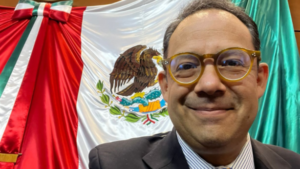Rodrigo Iván Cortés, secretary general of the Political Network for Values (PNfV) and president of the National Front for the Family (FNF), has been unjustly convicted in a Mexican court for alleged “gender-based political violence” against a congressman who claims to be a “transgender woman.”
In September 2022, Congressman Salma Lúevano Luna announced a bill to punish ministers of worship who preach Christian teachings on human sexuality, under the accusation of “incitement to hatred”, and did so by going up to the rostrum of Congress disguised as a Catholic bishop and with aggressive language, as can be seen in this video.
The event generated great indignation. Mexico is a country where 79% of the population is Catholic.
Immediately, the FNF warned, through its president, that Lúevano’s legislative initiative put at risk the freedom of expression and religious freedom, guaranteed by the country’s Constitution; and regretted the aggravation to Christians caused by the parliamentarian’s improper use of religious symbols and ornaments.
In a video, disclosed in the social networks of the Front, Cortes said: “the transsexual deputy, a man who ascribes himself as a woman, who demands respect, but it is exactly what he does not give; he asks for what he does not give, with a tremendous lack of respect”.
Seeing that the controversy was growing, in order to divert attention from the offense he inflicted, Lúevano opened a lawsuit against Cortés alleging that, by not recognizing him as a woman in his video, he violated “identity rights” and propagated “hate speech”. The aggressor went on to present himself as a victim.
Condemnation for alleged “gender-based political violence”
In February of this year, the Specialized Regional Chamber of the Electoral Tribunal of the Federal Judiciary (TEPJF) issued a ruling in which it condemned Cortés for “political violence against women based on gender”, and determined that the FNF’s questioning “was offensive and discriminatory by rejecting the gender identity and devaluing the performance of the federal deputy, which constituted digital, symbolic, psychological and sexual violence against her”.
For the court, criticizing a “transgender woman” undermines “the political-electoral rights of women and the free exercise of her public office”.
Cortés contested the ruling and appealed to the Superior Chamber of the TEPJF, the highest constitutional court in the country for electoral matters and the last instance in Mexico for the case. If the Superior Chamber upholds the ruling, Cortes will denounce the Mexican State before the Inter-American Court of Human Rights for openly violating fundamental freedoms.
Faced with the unjust ruling, Jaime Mayor Oreja, former Spanish Minister of the Interior, honorary president and co-founder of PNfV, expressed his support for Cortés:
If you would like to help Rodrigo Iván Cortés, sign this FNF petition.
To disagree is not to discriminate
“Dissent is not discrimination, and peaceful dissent should never be criminalized as violence. It is deeply troubling that Cortés, exercising his right to peacefully share his views on an issue of significant current debate, has been condemned for ‘political violence’ when, in fact, it is his opponents who have a history of perpetuating unrest within Mexico’s political institutions,” says Kristina Hjelkrem, legal counsel for ADF International, which is providing technical support to Cortés’ defense.
And she warns, “Freedom of expression is very much under threat in Mexico at the moment, and has reached a crisis point with courts imposing severe censorship sanctions for the peaceful expression of opinions, as evidenced by this egregious case: which, unfortunately, is far from an isolated incident.”
The Quadri and Castell cases
In April 2022, federal deputy Gabriel Quadri was also accused by Lúevano and convicted of “gender-based political violence” for his tweets against transgender ideology and in defense of equality for women. The Superior Chamber of the TEPJF rejected Quadri’s appeal, called for his registration as a “gender-based political offender” and forced him to delete the tweets, pay a fine and make a public apology.
ADF International filed a petition with the Inter-American Commission on Human Rights seeking recognition of Quadri’s right to freedom of expression. Quadri is waiting for the Commission to declare the case admissible.
And in May of this year, Congresswoman Teresa Castell was also convicted by the same court for alleged “gender-based political violence” against Congressman Lúevano.



